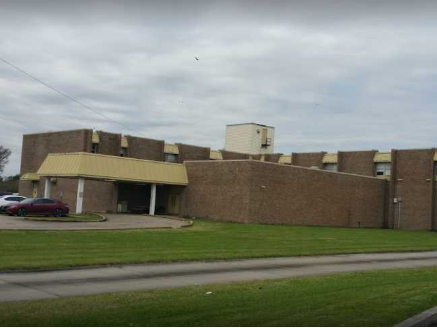Southeast Louisiana VA HCS

Contact Details
-
Name:Southeast Louisiana VA HCS
-
Address:6433 West Park Avenue
Houma, LA - 70364 -
Phone:985-851-0188
-
Email:
-
Instagram:
-
Website:
Description
There are currently state and federally funded or sponsored drug and alcohol treatment centers in the state of Louisiana
Questions & Answers
Help others like you find out more about Southeast Louisiana VA HCS. Do you know the answers to any of these questions? Contribute now and help others like you.
What kinds of care do they offer?
-
Mental health treatment
Includes interventions such as therapy or psychotropic medication that treat a person's mental health problem or condition, reduce symptoms, and improve behavioral functioning and outcomes.
What types of treatment approaches do they offer?
-
Individual psychotherapy
Focuses on a patient's current life and relationships within the family, social, and work environments through one-on-one conversations with a therapist. The goal is to identify and resolve problems with insight, as well as build on strengths.
-
Group therapy
Involves groups of usually 4 to 12 people who have similar problems and who meet regularly with a therapist. The therapist uses the emotional interactions of the group's members to (1) help them get relief from distress and (2) possibly modify their behavior.
-
Cognitive behavioral therapy
Involves recognizing unhelpful patterns of thinking and reacting, and then modifying or replacing these with more realistic or helpful ones. The therapy can be conducted with individuals, families, or groups, and clients are generally expected to be active participants in their own therapy.
-
Telemedicine/telehealth therapy
The ability for healthcare providers, working from a distance using telecommunications technology, to communicate with patients, diagnose conditions, provide treatment, and discuss healthcare issues with other providers to ensure quality healthcare services are provided. Other names used for this treatment approach are: e-medicine, e-therapy, e-psychiatry, and telepsychiatry.
-
Smoking not permitted
Smoking is not allowed.
What type of setting is this location?
-
Outpatient
Describes patients who receive treatment services without an overnight stay at a treatment facility or hospital.
Who is responsible for the operation of this facility?
-
U.S. Department of Veterans Affairs
Facility operated by the U.S. Department of Veterans Affairs, including general hospitals, and/or residential treatment programs, and/or?psychiatric out?patient clinics.
-
Federal Government
What types of payment or funding do they accept?
-
U.S. Department of VA funds
Do they offer any emergency mental health services?
-
Crisis intervention team
A self-initiated community partnership between local law enforcement, county health services, mental health advocates, and mental health consumers. It is designed to address the needs of mental health consumers who enter the judicial system during a crisis state.
-
Psychiatric emergency walk-in services
Designed to provide accessible, professional, cost-effective services to individuals in psychiatric crisis, and strive to stabilize consumers on site and avoid psychiatric hospitalization whenever possible.
What language services are offered?
-
Sign language services for the deaf and hard of hearing
Service provided for persons who are deaf and hard of hearing.
What specific groups are treated here?
-
Lesbian, gay, bisexual, transgender, or queer/questioning (LGBTQ)
Facility has a program or group specifically tailored for LGBT clients.
-
Veterans
Facility has a program or group specifically tailored for Veterans.
-
Active duty military
Facility has a program or group specifically tailored for active duty military persons.
-
Seniors or older adults
Facility has a program or group specifically tailored for Seniors or older adults.
-
Clients who have experienced trauma
Facility has a program or group specifically tailored for persons who have experienced trauma.
-
Clients who have experienced intimate partner violence, domestic violence
Facility has a program or group specifically tailored for persons who have experienced intimate partner violence, domestic violence.
-
Persons 18 and older with serious mental illness (SMI)
Facility has a program or group specifically tailored for persons with serious mental illness.
-
Persons with Alzheimer's or dementia
Facility has a program or group specifically tailored for persons with Alzheimer's or dementia.
-
Persons with post-traumatic stress disorder (PTSD)
Facility has a program or group specifically tailored for persons with post-traumatic stress disorder.
What ancillary services are offered at this facility?
-
Chronic disease/illness management
A systematic approach to improving health care for people with chronic disease. Central to most CDM approaches are patient self-management, physician education, and organizational support. Among the variety of strategies employed are case management, continuous quality improvement, disease management (DM) and the chronic care model (CCM).
-
Education services
Locate or provide educational services from basic literacy through a general equivalency diploma and college courses including special education at the pre-primary, primary, secondary, and adult levels.
-
Family psychoeducation
Helps consumers and their families and supporters, through relationship building, education, collaboration, and problem solving to: 1) learn about mental illness; 2) master new ways of managing their mental illness; 3) reduce tension and stress within the family; 4) provide social support and encouragement to each other; 5) focus on the future; and 6) find ways for families and supporters to help consumers in their recovery.
-
Integrated primary care services
Address the general health care needs of persons with mental health and substance use problems. These general health care needs include the prevention and treatment of chronic illnesses (e.g., hypertension, diabetes, obesity, and cardiovascular disease) that can be aggravated by poor health habits such as inadequate physical activity, poor nutrition, and smoking. The services include screening, coordinating care among behavioral health care staff and medical staff; and providing linkages to ensure that all patient needs are met in order to promote wellness and produce the best outcomes.
-
Suicide prevention services
Include identifying risk factors; educating staff on identifying the signs of suicidal behavior and using methods to detect risk; and the assessment, intervention, and management of suicidal patients including treatment of an underlying mental or substance use disorder, and use of psychotropic medication, supportive services, and education. Hotlines help individuals to contact the nearest suicide prevention mental health provider.
-
Supported employment
Services include assisting individuals with finding work; assessing individuals' skills, attitudes, behaviors, and interest relevant to work; providing vocational rehabilitation and/or other training; and providing work opportunities.
-
Supported housing
Independent, normal housing with flexible, individualized supportive services that allow individuals to maintain as much independence as possible.
-
Vocational rehabilitation services
Include job finding/development; assessment and enhancement of work-related skills (such as writing a resume or taking part in an interview), attitudes, and behaviors; as well as providing job experiences to clients/patients. Transitional employment is also included.
What types of recovery support services are offered here?
-
Housing services
Are designed to assist individuals with finding and maintaining appropriate housing arrangements.
What specific pharmacotherapy treatments do they provide?
-
Nicotine replacement
Administers nicotine to the body by means other than tobacco, without other harmful chemicals found in tobacco. Common forms of nicotine replacement therapy are nicotine patches, nicotine gum or lozenges, nasal spray and inhaler. The goal of nicotine replacement is to prevent cravings in a tobacco user, allowing the person to abstain from tobacco.
-
Chlorpromazine
Chlorpromazine is used to treat the symptoms of schizophrenia and to treat the symptoms of mania in people who have bipolar disorder. It helps you to think more clearly, feel less nervous, and take part in everyday life. It can reduce aggressive behavior and the desire to hurt yourself/others. It works by helping to restore the balance of certain natural substances in the brain.
-
Fluphenazine
Fluphenazine is a decades-old antipsychotic medication used to treat schizophrenia and psychotic symptoms such as hallucinations, delusions, and hostility.
-
Haloperidol
Haloperidol is used to treat psychotic disorders and is also used to control motor tics and verbal tics in adults and children who have Tourette's disorder. Haloperidol is also used to treat severe behavioral problems such as explosive, aggressive behavior or hyperactivity in children who cannot be treated with psychotherapy or with other medications. Haloperidol is in a group of medications called conventional antipsychotics. It works by decreasing abnormal excitement in the brain.
-
Loxapine
-
Perphenazine
-
Pimozide
-
Thioridazine
-
Trifluoperazine
-
Antipsychotics used in treatment of SMI
A multi-disciplinary clinical team approach, helps those with serious mental illness live in the community by providing 24-hour intensive community services in the individual's natural setting.
What types of screening and assessment methods are used here?
-
Screening for tobacco use
Determines a client's use of tobacco products, such as cigarettes, cigars, pipe tobacco, or smokeless tobacco. It is generally recommended that providers screen for tobacco use on a regular basis by asking clients, as they are seen, about their current and past use of tobacco products and their exposure to secondhand smoke or tobacco.
What kinds of education and counseling services are offered here?
-
Smoking/vaping/tobacco cessation counseling
Includes interventions for persons who use tobacco and want help with stopping, including behavioral support or counseling in groups or individually.
What age groups are accepted here?
-
Young Adults
Facility accepts young adults (13-25) for treatment.
-
Adults
Facility accepts adults (26-64) for treatment.
-
Seniors
Facility accepts seniors (65 or older) for treatment.
What types of testing do they offer?
-
TB screening
Skin tests that are used to screen people who are at high risk for TB exposure such as people with diseases or conditions that weaken their immune system.
-
Laboratory testing
What type of facility is this?
-
Veterans Affairs Medical Center or other VA healthcare facility
Is vaping allowed at this facility?
-
Vaping not permitted
How do I apply for admission at this location?
Have you been to this facility? What was your experience?
Is there a wait-list for treatment center?
Is any payment required?
Related Posts
Claire House for Women and Children
- Morgan City, LA
- 31.07 miles away
Capital Area Human Services
- Donaldsonville, LA
- 36.56 miles away


